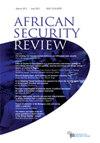Lies or half-truths? Boko Haram’s ideology from a social movement theory perspective
IF 1.1
Q3 INTERNATIONAL RELATIONS
引用次数: 3
Abstract
ABSTRACT Using Social Movement Theory (SMT) as a methodological framework and explicitly employing the core SMT concepts of political opportunism and framing, this paper seeks to examine Boko Haram's use of discourse in activism. As a rarely employed research method within the Boko Haram literature, SMT holds explanatory power around the movement's approach to transforming motivation potential into actual mobilisation via frame resonance. Focusing on the application of framing within (interpreted) sermons, lectures and exhortations by both Muhammad Yusuf and Abubakar Shekau as former substantive leaders of Boko Haram, this paper unpacks the discourse of Boko Haram's ideology. The paper shows that this ideology, which contrasts the softened core of the Salafist/Wahhabi doctrines from which Boko Haram broke away, relies on problematic interpretations of Qur’ānic exegesis and political thought as both relate to faith and governance in northern Nigeria. One policy recommendation to emerge from this study is that counter-narratives to Boko Haram's ideology should highlight not just why but also how the group's rhetoric employs lies and half-truths in an attempt to rationalise its activism; despite what appears to be an adherence to Qur’ānic exegesis, in making its claims.谎言还是半真半假?社会运动理论视角下的博科圣地意识形态
本文以社会运动理论(SMT)作为方法论框架,并明确采用SMT的核心政治机会主义和框架概念,试图研究博科圣地在行动主义中对话语的使用。作为博科圣地文献中很少使用的研究方法,SMT对该运动通过框架共振将动机潜力转化为实际动员的方法具有解释力。本文将重点放在穆罕默德·优素福(Muhammad Yusuf)和阿布巴卡尔·谢考(Abubakar Shekau)作为博科圣地前实质性领导人的布道、演讲和劝诫(解释)中框架的应用上,并对博科圣地的意识形态话语进行了剖析。这篇论文表明,这种意识形态与博科圣地脱离的萨拉菲斯特/瓦哈比教义的软化核心形成鲜明对比,它依赖于对古兰经ānic训诂和政治思想的有问题的解释,这两者都与尼日利亚北部的信仰和治理有关。从这项研究中得出的一个政策建议是,对博科圣地意识形态的反叙述不仅应该强调为什么,而且应该强调该组织的言论是如何使用谎言和半真半假的事实来试图为其行动主义辩护的;尽管似乎是坚持古兰经ānic的训诂,在提出它的主张。
本文章由计算机程序翻译,如有差异,请以英文原文为准。
求助全文
约1分钟内获得全文
求助全文

 求助内容:
求助内容: 应助结果提醒方式:
应助结果提醒方式:


